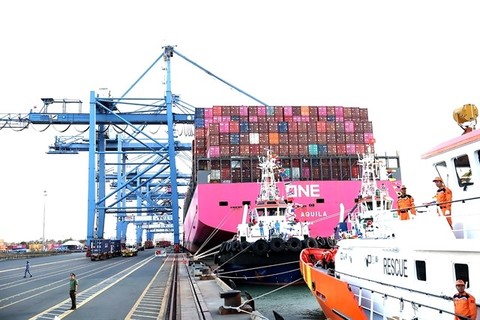
Goods loaded at Tân Cảng - Cái Mép International Port in the southern province of Bà Rịa - Vũng Tàu. — VNA/VNS Photo
Many bright spots were seen in the economic panorama in the first seven months of this year thanks to the Government’s continuous efforts to perfect the institutions, remove difficulties for businesses and promote economic growth.
In July, the Government sped up the issuance of guiding documents for many newly-adopted laws, including the law on amendments to a number of articles of the 2024 Land Law, the 2023 Housing Law, the 2023 Law on Real Estate Business, and the 2024 Law on Credit Institutions.
The Government also issued a dispatch clarifying major measures and solutions to boost growth, rein in inflation and stabilise the macro-economy in July and the third quarter of this year, a document on speeding up public investment disbursement, and a notification on dealing with obstacles facing major transportation projects in the Mekong Delta region, HCM City, and other localities.
According to a report by the General Statistics Office (GSO) on the socio-economic situation in July and the first seven months of 2024, the macro-economic situation was kept stable, inflation was under control and major balances ensured.
The consumer price index (CPI) in July rose 0.48 per cent month on month and 4.36 per cent year on year. The index increased 4.12 per cent in the first seven months of this year, with core inflation rising by 2.73 per cent.
Meanwhile, positive signs were seen in foreign trade revenue, which hit about US$226.98 billion in the first seven months, up 15.7 per cent year on year, with a trade surplus of about $14.08 billion against the $16.5 billion recorded in the same time last year.
At the same time, disbursement of State budget capital in the January-July period was estimated to reach 40 per cent of the whole year’s plan, up 2.3 per cent year-on-year.
In seven months, 1,816 new projects were licensed with a total registered capital of $10.76 billion, a rise of 11.6 per cent in number and 35.6 per cent in value over the same period last year. About $12.55 billion of foreign direct investment was disbursed in the period, an increase of 8.4 per cent year-on-year, marking a record for seven months in five years.
However, GSO General Director Nguyễn Thị Hương held that along with the bright spots, the country’s economy still faced many difficulties, including unstable increase of the index of industrial production and weak purchasing power.
Dr. Cấn Văn Lực, Chief Economist of BIDV and Director of BIDV Training and Research Institute, said that the stock market continued to recover despite many challenges, while the real estate market kept its recovery and the disbursement of VNĐ120-trillion credit package remained slow.
Dr. Phạm Sỹ Thành, Director of the China Centre for Economic and Strategic Studies (CESS), said that in order to promote economic growth, together with continuing to increase consumer demand and expand markets, it is necessary to speed up and improve public investment disbursement, thereby boosting the rise in business investment demand.
The Ministry of Planning and Investment emphasised the need to focus on recovering and promoting investment of the non-State sector, while the Ministry of Industry and Trade recommended the strengthening of trade promotion and the diversification of import-export markets.
Economist Nguyễn Bích Lâm suggested that it is necessary to focus on promoting domestic aggregate demand to boost production and create jobs, while implementing solutions to stimulate consumption through tax and social security policies. — VNS